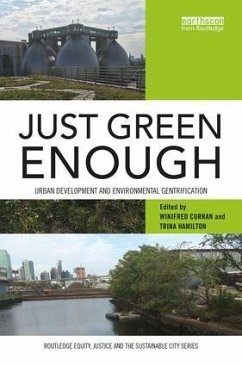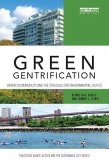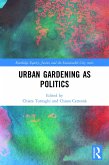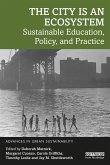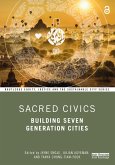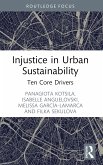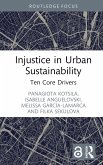While global urban development increasingly takes on the mantle of sustainability and "green urbanism," both the ecological and equity impacts of these developments are often overlooked. One result is what has been called environmental gentrification, a process in which environmental improvements lead to increased property values and the displacement of long-term residents. The specter of environmental gentrification is now at the forefront of urban debates about how to accomplish environmental improvements without massive displacement.
In this context, the editors of this volume identified a strategy called "just green enough" based on field work in Greenpoint, Brooklyn, that uncouples environmental cleanup from high-end residential and commercial development. A "just green enough" strategy focuses explicitly on social justice and environmental goals as defined by local communities, those people who have been most negatively affected by environmental disamenities, with the goal of keeping them in place to enjoy any environmental improvements. It is not about short-changing communities, but about challenging the veneer of green that accompanies many projects with questionable ecological and social justice impacts, and looking for alternative, sometimes surprising, forms of greening such as creating green spaces and ecological regeneration within protected industrial zones.
Just Green Enough is a theoretically rigorous, practical, global, and accessible volume exploring, through varied case studies, the complexities of environmental improvement in an era of gentrification as global urban policy. It is ideal for use as a textbook at both undergraduate and graduate levels in urban planning, urban studies, urban geography, and sustainability programs.
In this context, the editors of this volume identified a strategy called "just green enough" based on field work in Greenpoint, Brooklyn, that uncouples environmental cleanup from high-end residential and commercial development. A "just green enough" strategy focuses explicitly on social justice and environmental goals as defined by local communities, those people who have been most negatively affected by environmental disamenities, with the goal of keeping them in place to enjoy any environmental improvements. It is not about short-changing communities, but about challenging the veneer of green that accompanies many projects with questionable ecological and social justice impacts, and looking for alternative, sometimes surprising, forms of greening such as creating green spaces and ecological regeneration within protected industrial zones.
Just Green Enough is a theoretically rigorous, practical, global, and accessible volume exploring, through varied case studies, the complexities of environmental improvement in an era of gentrification as global urban policy. It is ideal for use as a textbook at both undergraduate and graduate levels in urban planning, urban studies, urban geography, and sustainability programs.
"Hamilton and Curran's concept of 'Just Green Enough' has become a rallying cry for academics and activists trying to decouple environmental clean-up from high-end residential and commercial development. The cases in this timely and excellent book illuminate this goal, offering us hope for a transition toward more just sustainabilities." - Julian Agyeman, Professor of Urban and Environmental Policy and Planning, Tufts University
"This is an essential book demonstrating the need for a new ecological, political, and social imagination to place interactional, reparative, distributional, and participative justice at the center of green city planning. Only through transformative green planning and creative lasting alliances will green interventions be public goods rather than environmental privileges." - Isabelle Anguelovski, ICREA Research Professor and Director, Barcelona Lab for Urban Environmental Justice and Sustainability, Universitat Autònoma de Barcelona
"In 2012, Curran and Hamilton came up with 'Just Green Enough,' a welcome vision for environmentally-minded urban development that foregrounded social justice and equity. Six years later, the concept's originators bring us this provocative look at the pitfalls and promises of JGE strategies, offering both sobering assessments and hopeful ways forward." - Melissa Checker, Associate Professor of Anthropology and Environmental Psychology, the CUNY Graduate Center
"As cities across the world are 'going green' through revitalization projects geared toward resilience and sustainability, they struggle with a major challenge: avoiding displacement and disenfranchisement associated with gentrification. This refreshing, provocative volume brings together leading scholars who dare to move beyond critique, by exploring and proposing strategies and solutions." - Ryan Holifield, Associate Professor of Geography, University of Wisconsin-Milwaukee
"Just Green Enough brings passion, imagination, along with some redemption to the sustainable development paradox. With a global reach, the book's contributors eruditely reveal important insights and examples of diverse social relations that engender positive urban environmental change. A must read for students concerned with progressive social change." - Robert Krueger, Director, Environmental and Sustainability Studies, Worcester Polytechnic Institute
"This is an essential book demonstrating the need for a new ecological, political, and social imagination to place interactional, reparative, distributional, and participative justice at the center of green city planning. Only through transformative green planning and creative lasting alliances will green interventions be public goods rather than environmental privileges." - Isabelle Anguelovski, ICREA Research Professor and Director, Barcelona Lab for Urban Environmental Justice and Sustainability, Universitat Autònoma de Barcelona
"In 2012, Curran and Hamilton came up with 'Just Green Enough,' a welcome vision for environmentally-minded urban development that foregrounded social justice and equity. Six years later, the concept's originators bring us this provocative look at the pitfalls and promises of JGE strategies, offering both sobering assessments and hopeful ways forward." - Melissa Checker, Associate Professor of Anthropology and Environmental Psychology, the CUNY Graduate Center
"As cities across the world are 'going green' through revitalization projects geared toward resilience and sustainability, they struggle with a major challenge: avoiding displacement and disenfranchisement associated with gentrification. This refreshing, provocative volume brings together leading scholars who dare to move beyond critique, by exploring and proposing strategies and solutions." - Ryan Holifield, Associate Professor of Geography, University of Wisconsin-Milwaukee
"Just Green Enough brings passion, imagination, along with some redemption to the sustainable development paradox. With a global reach, the book's contributors eruditely reveal important insights and examples of diverse social relations that engender positive urban environmental change. A must read for students concerned with progressive social change." - Robert Krueger, Director, Environmental and Sustainability Studies, Worcester Polytechnic Institute

